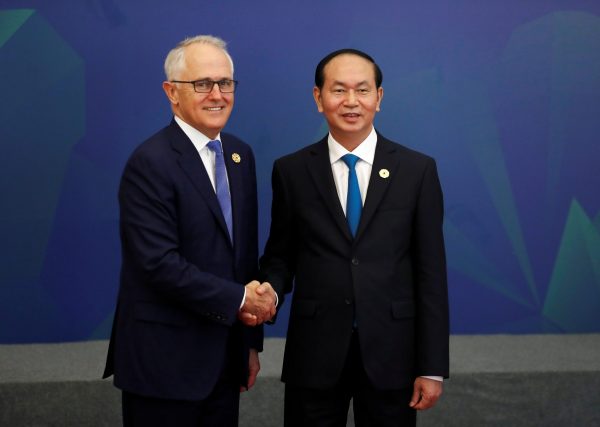Hanoi has pursued a strategic partnership with Canberra since as early as 2008. At the time, Australia was indifferent to such a proposal because of its perceived mere symbolism at the time and the potential confusion with other more important alliance relationships, particularly with Washington. The two countries declared a comprehensive partnership in 2009 and upgraded these ties to an advanced comprehensive partnership in 2015. Leaders of the two countries managed to bring their strengthening relationship into full play with the conclusion of the Australia–Vietnam Plan of Action (2016–2019).
The most recent upgrade to a strategic partnership paves the way for the two countries ‘to work more closely together on a range of issues, including defence, trade, investment, development, education, labour, tourism, law, finance, information and communication’. This strategic partnership goes along with the renewal of the current Australia–Vietnam Plan of Action that will expire next year.
Canberra’s elevation of bilateral ties to the strategic level — contrary to Australia’s complete indifference in the late 2000s — reflects the positive development of bilateral ties and the transformation of geopolitical conditions in the Asia Pacific region. In the economic domain, Vietnam is Australia’s fastest growing partner in trade in all of Southeast Asia. In less than a decade, two-way trade has doubled in value. Vietnam ranks fourth in terms of sending international students to Australia, with approximately 22,500 Vietnamese students in Australian educational institutions. And Vietnam hosts Australian investment projects worth about US$1.5 billion (AU$2 billion).
The depth of bilateral ties is also reflected in the conclusion of fourteen human rights dialogues since 2002, five rounds of the joint Foreign Affairs/Defence Australia–Vietnam Strategic Dialogue at the deputy secretary/vice-minister level since 2012, multiple Defence Ministers’ Meetings since 2013 and other forums.
Both Australia and Vietnam benefit from the elevation of the relationship, especially in the economic and strategic domains. For Vietnam, it is a long-awaited event and a diplomatic success. Australia adds to Hanoi’s list of strategic partners that includes, but is not limited to, Russia, Japan, India, China, South Korea, the United Kingdom, Germany and France (but not the United States yet). With Australia in this influential group, Hanoi has a better tool to balance against imminent security threats.
The partnership meets Canberra’s new strategic interests, given Beijing’s increased assertiveness in the South China Sea and Washington’s ambiguous commitment to the region under President Donald Trump. Being Vietnam’s strategic partner arguably paves the way for Canberra to further engage with Southeast Asia, a region of increased significance to Australia. Canberra needs additional advocates that support the idea of upholding a rules-based international order.
Reliable friends in Australia’s near region may help Australia protect itself from external threats, especially given uncertainty about US commitments to the region. There is concern regarding Trump’s willingness to risk a direct confrontation or war with Beijing to protect US dominance in the Asia Pacific region. Stronger Australia–Vietnam relations can also be viewed as a supplement to the current Quadrilateral Security Dialogue among Australia, India, Japan and the United States.
The strategic partnership obviously creates greater opportunities and higher expectations for cooperation between Vietnam and Australia bilaterally and regionally. Given the good trajectory of existing relations, these upgraded ties will significantly enhance the fruits of cooperation. Both countries will have better opportunities to access each other’s markets for economic growth.
At the same time, the changing regional and global context requires the two countries to make tougher choices in order to maintain peace, stability and prosperity in the Indo-Pacific region. Of note is the South China Sea maritime disputes. Canberra is abstaining from conducting joint freedom of navigation operations with Washington and has not shown any sign that it will change this policy.
But Canberra’s strategic partnership with Hanoi could pave the way for deeper cooperation between the Royal Australian Navy and the Vietnamese People’s Army in areas like capacity building in counter-terrorism, search and rescue and problems solving at sea. The two navies may also deepen trust and experience building, arrange more frequent port calls and conduct low level joint exercises within the framework of the Code for Unplanned Encounters at Sea. A joint freedom of navigation operation may still be unlikely but multilateral naval patrols to address non-traditional security threats could benefit all nations with stakes in regional security. As Christopher Roberts proposed a few years ago, ‘the increased presence of “friendly” navies in the South China Sea will provide a degree of deterrence against future coercive action’.
Upgrading bilateral ties to a strategic partnership marks a new important milestone in Australia–Vietnam relations. But this partnership will only bring about concrete outcomes if Hanoi and Canberra can implement specific and practical cooperation programs. Australia and Vietnam must show other countries that their strategic partnership is not just symbolic in nature but a vivid demonstration of their significantly progressed ties.
Luc Anh Tuan is a PhD Candidate in the School of Humanities and Social Sciences at the University of New South Wales, Canberra.

